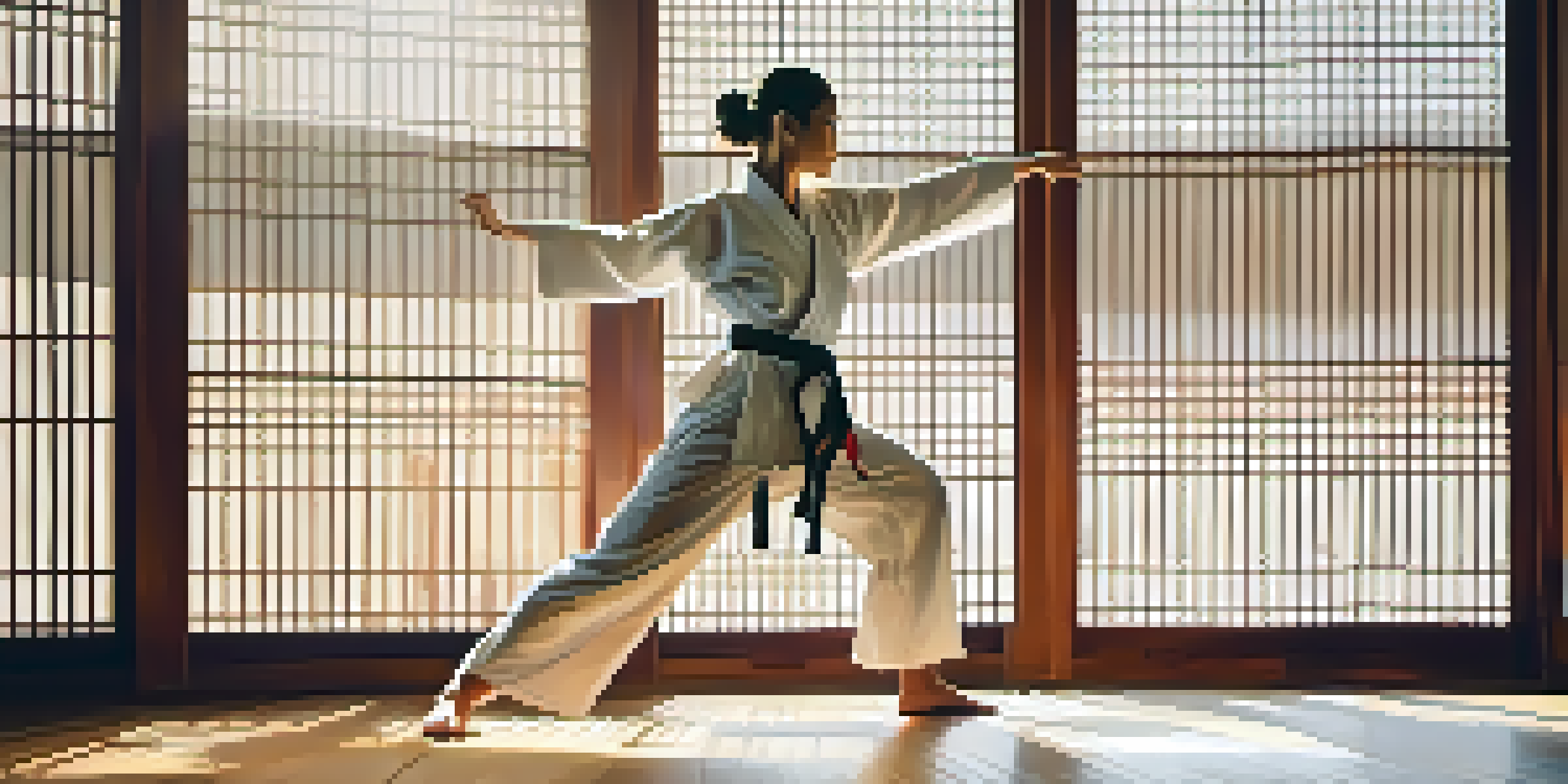Understanding the Role of Endurance in Self Defense Training

What Is Endurance and Why Does It Matter?
Endurance is the ability to sustain prolonged physical or mental effort. In the context of self-defense, it plays a crucial role in maintaining performance during high-stress situations. Imagine being in a scenario where you need to defend yourself; fatigue can significantly hinder your ability to react quickly and effectively.
Endurance is not just the ability to bear a hard thing, but to turn it into glory.
Having good endurance means that you can keep performing your techniques, even when your body is screaming for a break. This capability not only allows you to defend yourself more effectively but also gives you the mental clarity to make quick decisions under pressure. So, cultivating endurance isn’t just about physical fitness; it’s about enhancing your overall self-defense strategy.
Incorporating endurance training into your routine can be as simple as adding longer cardio sessions or circuit training to your workouts. As you build your endurance, you’ll find that you can perform self-defense techniques more fluidly and with greater confidence, which is essential when facing a potential threat.
How Endurance Impacts Self-Defense Techniques
Every self-defense technique requires a combination of strength, agility, and endurance. When you focus on building endurance, you’re not just increasing your stamina; you’re enhancing your ability to execute techniques repeatedly and efficiently. For example, a well-timed kick or strike loses its effectiveness if you’re too fatigued to deliver it properly.

Moreover, endurance training helps you maintain proper form and technique even when you're tired. Think of it like running a marathon; if you start to tire, your posture may slump, and your speed may drop, which can lead to injury or ineffective moves in a self-defense scenario. Thus, the more endurance you build, the more reliable your self-defense skills become.
Endurance Enhances Self-Defense Skills
Building endurance improves your ability to perform self-defense techniques effectively, even under fatigue.
Additionally, endurance training can improve your recovery time. The quicker you recover from fatigue, the sooner you can regain control of a situation. This advantage can make a significant difference, especially in high-pressure encounters.
Building Endurance Through Specific Exercises
To enhance your endurance for self-defense, consider incorporating specific exercises into your training regimen. High-Intensity Interval Training (HIIT) is an excellent option because it mimics the bursts of energy required during a confrontation. For instance, alternating between short sprints and recovery periods can boost your overall stamina efficiently.
The difference between a successful person and others is not a lack of strength, not a lack of knowledge, but rather a lack in will.
Another effective method is circuit training that combines strength and cardio. By performing a series of exercises back-to-back with minimal rest, you can elevate your heart rate and build muscular endurance simultaneously. Think of it as a self-defense workout where every movement contributes to your ability to react swiftly when it matters most.
Don’t forget about the importance of consistency. Like building any skill, regular practice is key to increasing your endurance. Aim for at least three endurance-focused workouts per week, and you’ll start to notice improvements in both your physical capability and mental resilience.
Mental Endurance: The Often Overlooked Aspect
While physical endurance is vital, mental endurance is just as crucial for self-defense training. In a stressful situation, your mental state can dictate how effectively you respond. Building mental endurance means training your mind to stay focused and calm, even when your body is fatigued and under pressure.
Techniques such as visualization can enhance mental endurance. Picture yourself successfully defending against various scenarios in your mind’s eye. This kind of mental rehearsal can help condition your brain to remain composed and effective when faced with real-life challenges.
Mental Endurance is Crucial
Training your mind to stay focused and calm under pressure is essential for effective self-defense.
Moreover, engaging in mindfulness practices can also support mental endurance. Techniques like meditation or focused breathing help improve your ability to stay present, increasing your capacity to react appropriately during stressful situations. Just as you train your body, don’t forget to train your mind.
Endurance Training and Injury Prevention
Building endurance not only boosts your performance but also plays a significant role in injury prevention. When your body is conditioned to handle prolonged exertion, you’re less likely to experience fatigue-related injuries during self-defense training. Think of it like strengthening the foundation of a house; a solid base can withstand more stress without collapsing.
Moreover, endurance training enhances your body’s overall resilience, allowing you to recover more quickly from physical exertion. This resilience means that you're less likely to suffer from strains or sprains when practicing demanding techniques. For example, if your muscles are well-conditioned, they’ll better support your joints during high-impact movements.
Incorporating flexibility training alongside endurance workouts can further reduce your injury risk. Stretching improves your range of motion and helps your muscles recover, making them less prone to injury. Ultimately, a well-rounded training approach that includes endurance is key to staying safe while training.
Real-Life Applications of Endurance in Self-Defense
The importance of endurance in self-defense becomes clear when you consider real-life situations. If you find yourself in a confrontation, the ability to maintain your energy and composure can mean the difference between escaping safely or becoming overwhelmed. The better your endurance, the more options you have to manage the threat effectively.
For instance, consider a scenario where you need to escape from an attacker. If you’ve trained for endurance, you’ll be better equipped to run or evade for longer periods, increasing your chances of finding safety. This real-world application highlights why endurance training is not just about fitness; it’s about survival.
Injury Prevention Through Endurance
Developing endurance reduces the risk of injury during self-defense training by enhancing overall body resilience.
Moreover, building endurance can help you feel more confident in your abilities. Knowing that you have the stamina to back up your self-defense techniques allows you to approach potentially dangerous situations with a clearer mindset. This confidence can be a powerful tool in deterring threats before they escalate.
Conclusion: The Vital Role of Endurance in Self-Defense
In conclusion, endurance is a foundational element of effective self-defense training. From enhancing your physical capabilities to improving mental resilience, the benefits of building endurance cannot be overstated. By prioritizing endurance in your training regimen, you're not just preparing your body—you're equipping yourself with the tools needed to respond effectively in real-life situations.
As you embark on your journey to improve your self-defense skills, remember to include both physical and mental endurance training. This holistic approach will not only make you a stronger defender but also instill a greater sense of confidence and readiness to face any challenge that may arise.

Ultimately, whether you are a beginner or an experienced martial artist, embracing endurance training will elevate your self-defense practice, making you more capable and prepared for whatever comes your way.